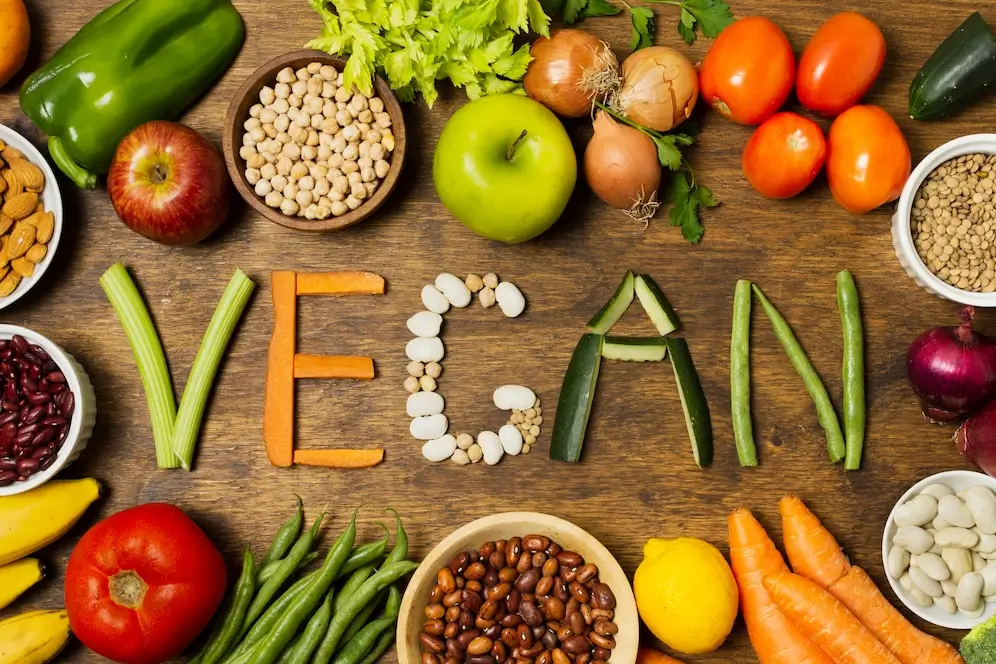Understanding the Health Benefits of a Vegan Diet
In recent years, the vegan diet has gained significant traction, not just as a trend but as a lifestyle choice driven by ethical, environmental, and health considerations. Embracing a vegan diet involves abstaining from all animal products, including meat, dairy, and eggs. Let’s delve into the numerous health benefits that come with adopting a vegan lifestyle.
Table of Contents

Definition of a Vegan Diet
A vegan diet excludes all animal-derived products, emphasizing plant-based foods such as fruits, vegetables, grains, and legumes. It’s a conscious choice that extends beyond dietary preferences to encompass environmental and ethical considerations.
Growing Popularity of Veganism
As awareness about the environmental impact of animal agriculture and ethical concerns regarding animal welfare grows, more individuals are embracing veganism. This shift has prompted a closer look at the health benefits associated with a vegan diet.
1. Nutritional Benefits
Rich in Nutrients
A well-planned vegan diet can provide all the necessary nutrients the body needs. Plant-based foods offer a wide range of vitamins, minerals, and antioxidants crucial for overall health.
Lower Cholesterol Levels
One notable benefit is the reduction in cholesterol levels. Vegan diets are naturally low in saturated fats found in animal products, contributing to improved cardiovascular health.
High Fiber Content
Fiber is abundant in plant-based foods, promoting digestive health and aiding in weight management. The increased fiber intake also helps regulate blood sugar levels.
2. Weight Management
Effective for Weight Loss
Many individuals turn to a vegan diet for weight management, as plant-based foods tend to be lower in calories and saturated fats. This can be a sustainable approach to shedding excess weight.
Increased Metabolism
Certain plant-based foods, such as green tea and spices, have been linked to a boost in metabolism. This can aid in burning calories more efficiently, supporting weight loss efforts.
3. Improved Heart Health
Lower Blood Pressure
Studies indicate that a vegan diet may contribute to lower blood pressure levels. The absence of animal fats and cholesterol plays a role in reducing the risk of hypertension.
Reduced Risk of Heart Disease
By focusing on heart-healthy foods like nuts, seeds, and whole grains, individuals on a vegan diet may experience a decreased risk of heart disease compared to those consuming animal products.
4. Improved Digestion
Enhanced Gut Health
The abundance of fiber in plant-based diets supports a healthy gut microbiome, preventing constipation and promoting regular bowel movements.
Alleviation of Digestive Issues
Some individuals find relief from digestive issues like bloating and irritable bowel syndrome (IBS) when they switch to a vegan diet, emphasizing the importance of plant-based fiber.
5. Cancer Prevention
Antioxidants in Plant-Based Foods
The presence of antioxidants in fruits and vegetables is believed to contribute to cancer prevention by neutralizing free radicals that can damage cells.
Studies on Reduced Cancer Risk
Several studies suggest a correlation between a vegan diet and a decreased risk of certain cancers, including breast, colon, and prostate cancers.
6. Diabetes Management
Stabilizing Blood Sugar Levels
The high fiber content and low glycemic index of many plant-based foods contribute to better blood sugar control, potentially reducing the risk of type 2 diabetes.
Preventing Type 2 Diabetes
Research indicates that adopting a vegan diet may be an effective strategy for preventing and managing type 2 diabetes, offering benefits for insulin sensitivity.
7. Increased Energy Levels
Plant-Based Foods for Sustained Energy
A well-balanced vegan diet provides a steady source of energy, eliminating the energy crashes associated with high sugar and processed foods.
Elimination of Energy-Draining Foods
The avoidance of heavy, animal-based meals can prevent the sluggishness often experienced after consuming meat and dairy products.
8. Clearer Skin
Anti-Inflammatory Properties
Certain components of a vegan diet, such as antioxidants and anti-inflammatory compounds, contribute to clearer skin by reducing inflammation and promoting skin health.
Radiant Skin from a Vegan Lifestyle
Individuals often report improvements in skin complexion and conditions like acne when they transition to a vegan lifestyle, attributing it to the absence of certain animal products.
9. Enhanced Mental Health
Impact on Cognitive Function
While more research is needed, some studies suggest a positive impact of plant-based diets on cognitive function, potentially reducing the risk of cognitive decline.
Connection between Diet and Mental Well-being
Nutrient-dense plant foods may contribute to overall mental well-being, emphasizing the importance of a holistic approach to health.
10. Environmental Impact
Reduced Carbon Footprint
Choosing a vegan lifestyle can significantly reduce one’s carbon footprint. The production of plant-based foods generally has a lower environmental impact compared to animal agriculture.
Conservation of Resources
The conservation of water and land resources associated with plant-based agriculture aligns with the growing concern for sustainable living.
11. Ethical Considerations
Compassionate Lifestyle
Beyond health benefits, adopting a vegan lifestyle reflects a commitment to compassion for animals, contributing to a more ethical and humane world.
Animal Welfare Advocacy
Individuals often turn to veganism as a form of activism, promoting awareness and advocating for improved animal welfare standards in the food industry.
12. Challenges of a Vegan Diet
Addressing Common Concerns
Common concerns, such as protein intake and nutrient deficiencies, can be addressed through careful planning and education about plant-based nutrition.
Tips for a Balanced Vegan Diet
Balancing macronutrients, incorporating a variety of plant foods, and considering supplements where necessary are key to a successful and sustainable vegan diet.
13. Transitioning to a Vegan Lifestyle
Gradual Changes for Beginners
For those considering a vegan lifestyle, gradual changes and education about plant-based nutrition can make the transition smoother and more sustainable.
Vegan Recipes and Meal Ideas
Exploring diverse and delicious vegan recipes can make the shift to a plant-based diet more enjoyable, dispelling any preconceived notions about bland or restrictive eating.

Conclusion
In conclusion, the health benefits of a vegan diet are diverse and well-supported by scientific research. From improved heart health to positive effects on mental well-being, adopting a vegan lifestyle can lead to a holistic enhancement of one’s overall health.
Frequently Asked Questions (FAQs)
Is a vegan diet suitable for everyone?
While a this diet can be healthy for many individuals, it’s essential to plan it carefully to ensure adequate nutrient intake. Consultation with a healthcare professional or nutritionist is advisable.
How can I ensure I get enough protein on a vegan diet?
Plant-based protein sources include beans, lentils, tofu, tempeh, and nuts. A varied and well-balanced diet can provide sufficient protein.
What are some common challenges faced by those transitioning to a vegan lifestyle?
Challenges may include social situations, nutritional concerns, and the need for meal planning. Addressing these gradually and seeking support can ease the transition.
Are there any potential downsides to a vegan diet?
While a this diet can be healthy, potential downsides may include nutrient deficiencies if not properly planned. Supplements may be necessary for certain nutrients like B12.
Can a vegan diet help with weight loss?
Many individuals experience weight loss on a diet due to its lower calorie and saturated fat content. However, individual results may vary.
How does a vegan diet impact the environment?
Choosing a vegan lifestyle is associated with a lower carbon footprint and reduced environmental impact compared to traditional animal agriculture.
Are there tasty and diverse options for vegan meals?
Absolutely! There is a vast array of delicious and diverse plant-based recipes available, catering to various tastes and preferences.
Is a vegan diet expensive?
While some specialty vegan products may be pricier, a well-planned diet with a focus on whole foods can be cost-effective and budget-friendly.